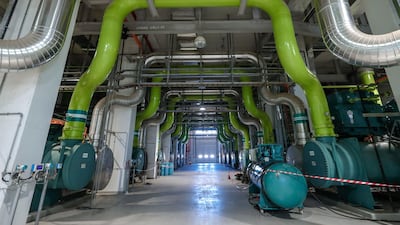Abu Dhabi’s Department of Energy has issued its first district cooling licence to Saadiyat Cooling, which serves Saadiyat Island, including Saadiyat Beach and Saadiyat Cultural District.
A second licence will be issued in the coming weeks to Saadiyat District Cooling, which serves New York University Abu Dhabi, according to a statement from the DoE.
Saadiyat District Cooling and Saadiyat Cooling provide district cooling to Saadiyat Island, the Louvre Abu Dhabi, NYUAD and Manarat Al Saadiyat. The National Central Cooling Company, also known as Tabreed, said in December that it is buying the two district cooling units on Saadiyat Island from Aldar Properties for Dh963 million ($262m).
The DoE also issued district cooling regulations and district cooling applicability regulations in September 2019, making Abu Dhabi the first jurisdiction in the Middle East and North Africa to set up a regulatory framework for district cooling.
“The district cooling industry is a key area of our mandate, and with that in mind, we issued the district cooling regulations to streamline operations in the sector, shift the focus squarely to the consumer, boost Abu Dhabi’s economic growth and champion sustainable practices and energy efficiency,” Mohammad Juma bin Jarsh Al Falasi, DoE undersecretary, said.
“The emirate has led the way in developing and now implementing the first comprehensive district cooling regulatory framework in the region, which provides a clear platform for future growth and investment.”
District cooling is a centralised cooling production and distribution system that uses an insulated underground pipe network to serve multiple buildings within the same area. The system is usually used for cooling residential buildings, commercial buildings, mixed-use buildings and densely populated areas. It is the most environmentally friendly option when it comes to air conditioning, reducing energy consumption up to 40 per cent more than conventional cooling systems and cutting carbon dioxide emission levels.
The DoE also announced the launch of the technical panel review process for the district cooling technical code and district cooling metering code on February 23. Panel members include district cooling providers, retailers, developers, Abu Dhabi Department of Municipalities and Transport, and Abu Dhabi Distribution Company. Membership is open to any entity that will be affected by the codes.
This initiative aims to ensure that views of all stakeholders in the emirate are considered in the review of the Code. Published in March 2020, the technical codes are performance-based specifications with defined key performance indicators. They aim to promote energy efficiency, sound water management, reliability of service and customer satisfaction, the DoE said.
“Implementing the DoE regulations in these two schemes promises to deliver substantial benefits to the emirate of Abu Dhabi, such as a possible reduction in consumption fees for more than 100 residential units in Saadiyat Beach Residence,” the statement said.
Other advantages include the transparency of costs, an increase in capacity for consumers; committed investment by licensees to upgrade district cooling plants and enhance service standards; and commitment from licensees to invest in more sustainable technologies that promote usage of recycled water at these schemes, sharing any resulting cost benefits with consumers in the future, the DoE added in the statement.

